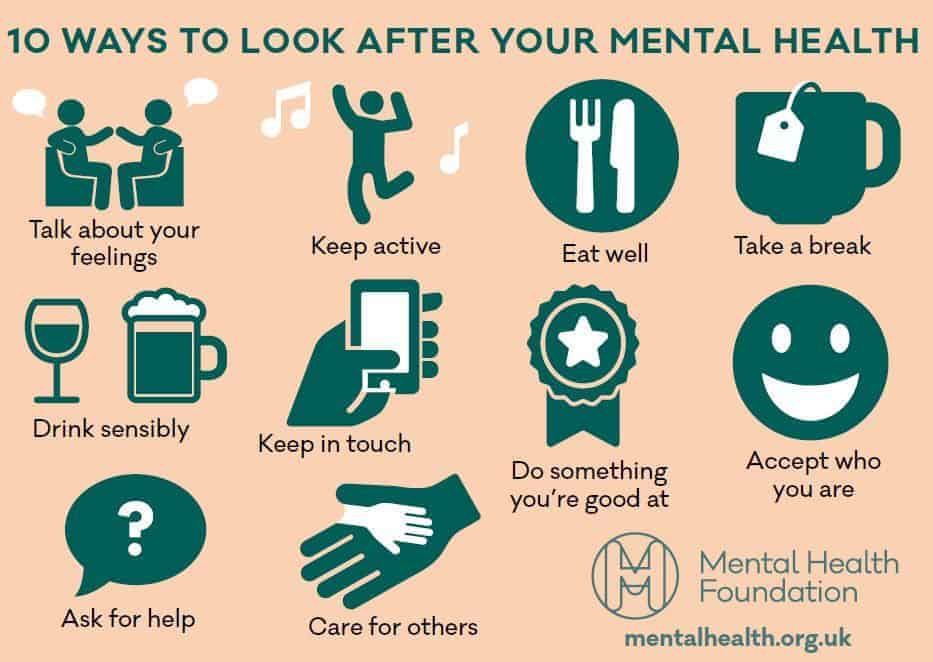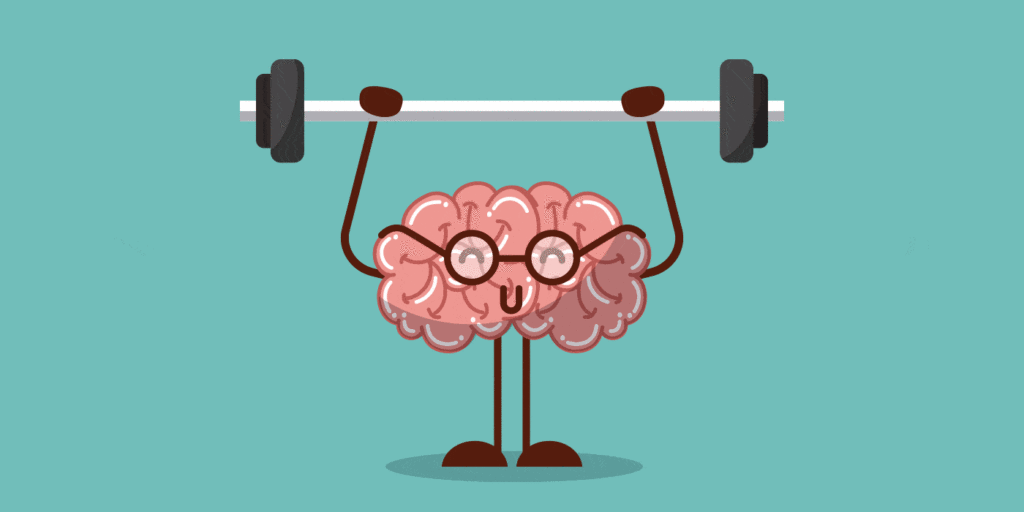This article looks at my personal experience with mental health and well-being. I don’t really want it to be about me but, as someone who’s not a mental health and well-being expert (and I have to be careful not to use the words interchangeably), sadly it has to be such for it to be positioned as what it is – an example of what a failure to maintain one’s mental health and well-being can result in (plus how to identify and prevent it happening).
I’d like to think that most people who know me – or are kind enough to pay me to write IT service management (ITSM)-related marketing collateral – think of me as a confident, reasonably smart (although often stupid), hardworking, individual. They’re not wrong (even about the “often stupid”) but there’s something that most people don’t know – I once suffered from a period of anxiety and depression, negative well-being, stress, or whatever you’re most comfortable calling: a time in someone’s life when they just aren’t “themselves.”
In my article, I’m going to explain:
- What it was like – so you know some of the signs (in the context of yourself, colleagues, friends, or loved ones)
- What it took to for me to “get better”
- How it still casts a shadow, such that I continue to use some of the original fixes (and new ones) to help me out
This mental health and well-being article might sound a pretty-uncomfortable read, but hopefully I’ll also make fun of myself – in a very British, self-deprecating way – as I write it.
I Just Didn’t See It Coming
“It’s easy with hindsight” as they say. But I didn’t see myself changing (as my mental health and well-being issues set in).
And I didn’t see it despite having had family members experience mental-health issues too. I guess I was too busy looking forward (in terms of them getting better) to understand what had caused them to have issues and particularly what their visible symptoms were.
I also thought that it wouldn’t happen to me (as I think we all do) – I was changing jobs (within the same employer) every 2-3 years and loving my work. So, I had a decent career. And I thought I was “mentally tough.”
And Then It Happened
As I’ve already admitted to, I just didn’t see it coming. And thus, I wasn’t in a position to start to change things, both professionally and personally, before it was too late.
All I remember is driving on the M1 (for those not in the UK, it’s a motorway not a fighter plane) and then, out of nowhere, I just started to cry. For absolutely no reason at all. I was simply crying, and I couldn’t stop.
It was like something inside me just broke. And I could finally see that I “wasn’t right.”
With hindsight, there were a number of things that should’ve been big giveaways, evidence that I was in a downward well-being spiral, but I didn’t really see them (in terms of taking notice) nor did I know that these things were “the signs.”
Mental Health and Well-being – The Signs (at Least for Me) That I Missed
I knew that things weren’t “going to plan” at work. IT service delivery projects were moving too slowly and – to put it politely – I knew that I was frustrated that some people, both internally and outsourced, just weren’t “cutting the mustard” (and they might have thought the same of me).
But I kept on trying to make things right. However, I had no team, nor direct peers, so it was “just me against the world.” So, it’s important to understand what it meant for me – as an individual.
I was busy. Very busy. I had a lot to think about and to do. And I was probably more frustrated, worried, annoyed, etc. than I realized. I didn’t see it as stress though, I just saw it as me failing to get things done. Plus, I cared – probably too much – about what I did and the impact I made. For me, work has never been the time spent sat at a desk, with it more about the difference I make.
But despite this inability to make things work, I guess I imagined – and I have to say “imagined” because I’ve very-conveniently blanked out a lot of my mid-2006 memories – that things would eventually work themselves out given the right focus of all involved. Because that’s what usually happened – I’d make things work either through smarts or graft (or both).
But, thankfully, I do remember many of my symptoms and how they were “the signs” that I just wasn’t myself:
- I’d wake up at 5am every day and immediately start thinking about work. And I couldn’t get back to sleep. This (5am) is silly o’clock in the UK, perhaps unless you commute into London, and as a homeworker starting their work day at 8:30, it was at least 2.5 hours too early.
- I couldn’t get to sleep at night. With the day’s events – often my frustrations and failures – just rattling around inside my head. Perhaps with me wishing that I’d said or done things differently.
- I couldn’t think straight, in fact I just couldn’t think. I couldn’t solve even relatively-easy problems or make quick decisions. My brain just didn’t work anymore. As was later explained to me (by a professional), my brain had simply run out of space to move the various jigsaw pieces around when solving mental puzzles.
- I’d get angry over the silliest of things. Probably as a result of the above points. And a lot of times it was totally unnecessary and, as often happens in life, one gets angry with the wrong people.
- I’d argue with myself inside my head. This is a strange one, and it might sound scary. But it wasn’t to me (in fact it seemed quite normal to someone who often reflected on what had happened during the day). It really was a mental conversation between (I guess) two sides of my brain which was argument-like.
There were probably other things too but, as I’ve already said, I’ve very-conveniently forgotten a lot from mid-2006.
Finally, there were other things – that appeared after I’d broken down – such as an odd sense of constant worry (or “anxiety”) and then a physical shaking of my hands when starting back at work.
Then There Was How I Felt About “My Situation”
It’s a slight detour, but I do this a lot in life… It’s my “special gift.”
I didn’t tell my family about what had happened to me, because I didn’t want them to worry about me (especially after what had happened to other family members – they’d had far more serious issues). And I didn’t tell them until a much later “life change” caused me to finally “come clean” about my mental health and well-being issues.
People at work knew (heck, there had to be a reason why I was off work for four weeks), probably even people that I didn’t know. Because that’s how office environments operate. And I never felt the same at work again. I felt less valuable. I also felt a stigma. And possibly to draw a line under the episode, I’d taken voluntary redundancy from this employer within 12 months of my time off work.
I’d also gotten to a point where I’d lost faith in myself and my employer (well, to be more precise, my boss).
But, despite having lost faith in myself, the optimist in me thought that I’d quickly get a new job based on my many qualifications, work experiences, “gift of the gab,” and cheeky smile. I didn’t though, despite 200+ job applications in the next 12 months (yes, I logged them all in a lovely green notebook).
Back then I still felt ashamed of what had happened to me – stress was “something that happened to people who weren’t good at their jobs.” And that wasn’t me. Now, I simply view it as the result of working too hard and caring too much (and probably having personal expectations that are far higher than others, i.e. being one’s own worst critic).
Mental Health and Well-being – What Did I Do To “Get Better”?
The first thing was seeking professional help and taking the doctor-advised time off work – four weeks. To allow me the space to get better. I also took the prescribed medication – I’ve no chance of remembering the name – with the aim of changing my brain’s chemical balance for the better.
Then there were certain things I was advised to do for mental health and well-being issues: walking as much as possible and listening to music, especially together. It’s odd, even now when I hear the songs I used to play on my “get better” walks I still get a strange surge of positivity and they make me smile. I probably read fiction books too – something I definitely don’t do enough of right now.
After four weeks I went back to work. I came off my tablets. But I don’t think I was ever the same person again (and I still don’t). It changed me as well as my work life.
The killer question is though: when was the last time I was the old me? Was it 2005, 2004, or perhaps even earlier? I just don’t know (and I think I’m happy with the new me, bar the snoring).<
Living with the After Effects of What Happened with My Mental Health and Well-being
Am I totally “alright” now? Well, it probably depends if I was alright before.
I know I have numerous personality quirks – if this is the right phrase – as most of us do, that have caused me to be who I am since childhood.
However, putting these peculiarities aside, there are still after effects from my breakdown (the mental health and well-being issues) in 2006. The most obvious – well, at least to me – is that I don’t remember my dreams (although I occasionally do). This could of course be blamed on my sleeping patterns, but I personally believe it to be a protective mental “shutdown” mechanism that shielded me from the nightmares (plus the nicer dreams) of old. And now of today.
Followed by “unnatural perspiration” (TMI I know) that occurs in certain situations – being around groups of people, doing DIY-type jobs (rather oddly), and even while sitting at my desk typing as I’m now doing. I’m hopeful it will go, at least for a while, the next time I get to spend two weeks chilling by a pool. But for now, the solution is a wardrobe full of Under Armour t-shirts.
Then there are the occasional times when I know that I’m feeling low (or becoming low) – despite being happy both personally and professionally. Thankfully, it’s probably once a year and I can usually hear it in my voice, in that it also seems low (as in deeper than usual), and I can then do certain things to sort myself out.
The oddest thing though is that my emotions are, shall we say, out of line with where I’d expect them to be. For instance, I can remain cold and distant with things that should cause concern, pity, or sympathy. But, on the other hand, I can get choked up and even cry at (what should be) happy things – especially those that relate to human kindness and achievements. It’s a silly example, but the recent Rosa Parks episode of Doctor Who did exactly this to me. Or if you get me talking about war heroes helping underprivileged kids, I’ll absolutely lose it. I don’t necessarily feel anything (inside), but my (external) physical emotions go crazy.
Some Final Tips to Takeaway
I’d love to help prevent others from getting to a point where their mental health and well-being declines, perhaps even such that it becomes a mental health issue.
So, taking note of the things that I didn’t do well, it’s so, so crucial to understand the importance of your mental (and physical) well-being.
It’s also important to appreciate that situations such as mine can happen to us all, especially if you take the view that many of the positive traits that you’d like to see in employees can unfortunately help to bring about the situation (i.e. hard work and caring too much).
You might not have realized but, given that this was 2006, it was pre-iPhone and the potential for 24×7 work connectivity. In that respect I think I was lucky.
There’s increasingly more help available online to help people to maintain their mental health and well-being. For instance, this infographic that was shared on Twitter for #WorldMentalHealthDay on October 10th:

I also have techniques, or tricks, to help me. I fall asleep listening to podcasts – because it simply switches my brain off. And I smile. I try to smile a lot, despite my personal capacity for moaning. It just makes me happier – try it to see how it feels.
I don’t do everything I should though. For instance, I definitely need to exercise more right now (in recent years this effort has gone up and down). But at least my knowing that this is needed is a good thing.
In finishing, please remember that this is just my personal experience of mental health and well-being issues and that I’m in no way an expert in either. I’m just sharing what happened to me as an example of what can happen and – importantly – what you can do to hopefully prevent something similar happening to you or someone close to you (or perhaps even to someone you loath). If you can add to what I’ve said, then please share your thoughts and tips in the comments. Or even better, if you have a story to tell, please contact me re sharing it on ITSM.tools.
If you would like to speak with someone about how you’re feeling, or about a friend, family member, or colleague, then please contact (charitable) mental-illness organizations such as SANE (in the UK) or similar that are available where you live.
Stephen Mann
Principal Analyst and Content Director at the ITSM-focused industry analyst firm ITSM.tools. Also an independent IT and IT service management marketing content creator, and a frequent blogger, writer, and presenter on the challenges and opportunities for IT service management professionals.
Previously held positions in IT research and analysis (at IT industry analyst firms Ovum and Forrester and the UK Post Office), IT service management consultancy, enterprise IT service desk and IT service management, IT asset management, innovation and creativity facilitation, project management, finance consultancy, internal audit, and product marketing for a SaaS IT service management technology vendor.


2 Responses
I came across this by chance and it’s a great read and It’s helped me
Thank you
Thanks for the feedback Keith. Our 2019 Future of ITSM survey had some worrying wellbeing-related findings https://itsm.tools/the-future-of-itsm-survey-results-2019/ and our new wellbeing-focused survey looks even worse.